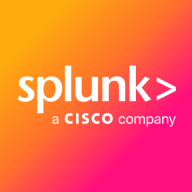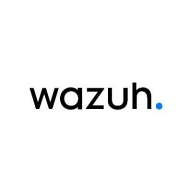

Splunk Enterprise Security and Wazuh are both significant competitors in the security information and event management (SIEM) space. Splunk Enterprise Security seems to have an advantage in complex environments due to its extensive data handling capabilities.
Features: Splunk Enterprise Security boasts extensive data ingest capabilities, operational intelligence, and schema-on-read technology. These make it highly adept for environments needing rapid data searches and compliance management. Wazuh provides robust open-source SIEM capabilities such as syscheck, file integrity monitoring, and threat intelligence integration, with a strong focus on compliance management through its PCI DSS and CIS benchmark features.
Room for Improvement: Splunk Enterprise Security could benefit from an improved user interface, enhanced security administration, and better integration with VMware and security devices. Additionally, simplifying its operational workflows and supporting a variety of ticketing systems would enhance its value in SOC environments. Wazuh, on the other hand, could improve detection capabilities, threat intelligence integration, and scalability, especially for larger enterprises. Enhancements in real-time monitoring for Unix systems and better support tools are also needed.
Ease of Deployment and Customer Service: Splunk Enterprise Security offers versatile deployment options supporting various environments, including public, private, hybrid clouds, and on-premises setups. While its customer service is backed by knowledgeable support staff, response times can vary. Wazuh is primarily deployed on-premises and in hybrid clouds, relying largely on community support which might suffice for smaller organizations but could be lacking for larger enterprises needing formal channels.
Pricing and ROI: Splunk Enterprise Security is noted for its high costs, aligned with its robust features, making it suitable for organizations willing to invest heavily in security. It promises significant ROI with the right implementation. Wazuh, being open-source, offers a cost-effective alternative free from licensing costs, ideal for budget-conscious organizations, although initial setup and maintenance require investment.
The documentation for Splunk Enterprise Security is outstanding. It is well-organized and easy to access.
We couldn't calculate what would have been the cost if they had actually gotten compromised; however, they were in the process, so every investment was returned immediately.
On average, my SecOps team takes probably at least a quarter of the time, if not more, to remediate security incidents with Splunk Enterprise Security compared to our previous solution.
I have seen value in security cost savings with Wazuh, as using proprietary EDR versions could save us substantial money.
We have paid for Splunk support, and we’re not on the free tier hoping for assistance; we are a significant customer and invest a lot in this service.
I have had nothing but good experiences with Splunk support, receiving timely and helpful replies.
We've had great customer success managers who have helped us navigate scaling from 600 gigs to 30 terabytes.
They responded quickly, which was crucial as I was on a time constraint.
We use the open-source version of Wazuh, which does not provide paid support.
The documentation is good and provides clear instructions, though it's targeted at those with technical backgrounds.
We currently rely on disaster recovery and backup recovery, which takes time to recover, during which you're basically blind, so I'm pushing my leadership team to switch over to a clustering environment for constant availability.
It is one of the things that separates it from other tooling, and if not, it is the most scalable solution out there.
They struggle a bit with pure virtual environments, but in terms of how much they can handle, it is pretty good.
It can accommodate thousands of endpoints on one instance, and multiple instances can run for different clients.
Currently, I don't see any limitations in terms of scalability as Wazuh can still connect many endpoints.
Scalability depends on the configuration and the infrastructure resources like compute and memory we allocate.
They test it very thoroughly before release, and our customers have Splunk running for months without issues.
Splunk has been very reliable and very consistent.
We need more SMEs, and there is no mechanism to tell us about indexer or search head issues.
The stability of Wazuh is strong, with no issues stemming from the solution itself.
The stability of Wazuh is largely dependent on maintenance.
The indexer frequently times out, requiring system restarts.
Improving the infrastructure behind Splunk Enterprise Security is vital—enhanced cores, CPUs, and memory should be prioritized to support better processing power.
Splunk Enterprise Security is not something that automatically picks things; you have to set up use cases, update data models, and link the right use cases to the right data models for those detections to happen.
For any future enhancements or features, such as MLTK and SOAR platform integration, we need more visibility, training, and certification for the skilled professionals who are working.
Machine learning is needed along with understanding user behavior and behavioral patterns.
The integration modules are insufficiently developed, necessitating the creation of custom integration solutions using tools like Logstash and PubSub.
I think Wazuh should improve by introducing AI functionalities, as it would be beneficial to see AI incorporated in the threat hunting and detection functionalities.
I saw clients spend two million dollars a year just feeding data into the Splunk solution.
The platform requires significant financial investment and resources, making it expensive despite its comprehensive features.
I find it to be affordable, which is why every industry uses it.
Wazuh is completely free of charge.
I would definitely recommend Wazuh, especially considering Fortinet's licensing model which is confusing and overpriced in my opinion.
Totaling around two lakh Indian rupees per month.
This capability is useful for performance monitoring and issue identification.
I assess Splunk Enterprise Security's insider threat detection capabilities for helping to find unknown threats and anomalous user behavior as great.
Splunk Enterprise Security provides the foundation for unified threat detection, investigation, and response, enabling fast identification of critical issues.
Wazuh is a SIEM tool that is highly customizable and versatile.
The system allows us to monitor endpoints effectively and collect security data that can be utilized across other platforms such as SOAR.
With this open source tool, organizations can establish their own customized setup.
| Product | Market Share (%) |
|---|---|
| Splunk Enterprise Security | 7.1% |
| Wazuh | 6.4% |
| Other | 86.5% |
| Company Size | Count |
|---|---|
| Small Business | 109 |
| Midsize Enterprise | 50 |
| Large Enterprise | 264 |
| Company Size | Count |
|---|---|
| Small Business | 27 |
| Midsize Enterprise | 15 |
| Large Enterprise | 8 |
Splunk Enterprise Security delivers powerful log management, rapid searches, and intuitive dashboards, enhancing real-time analytics and security measures. Its advanced machine learning and wide system compatibility streamline threat detection and incident response across diverse IT environments.
Splunk Enterprise Security stands out in security operations with robust features like comprehensive threat intelligence and seamless data integration. Its real-time analytics and customizable queries enable proactive threat analysis and efficient incident response. Integration with multiple third-party feeds allows detailed threat correlation and streamlined data visualization. Users find the intuitive UI and broad compatibility support efficient threat detection while reducing false positives. Despite its strengths, areas such as visualization capabilities and integration processes with cloud environments need enhancement. Users face a high learning curve, and improvements in automation, AI, documentation, and training are desired to maximize its potential.
What Are the Key Features of Splunk Enterprise Security?In specific industries like finance and healthcare, Splunk Enterprise Security is instrumental for log aggregation, SIEM functionalities, and compliance monitoring. Companies leverage its capabilities for proactive threat analysis and response, ensuring comprehensive security monitoring and integration with various tools for heightened operational intelligence.
Wazuh offers an open-source platform designed for seamless integration into diverse environments, making it ideal for enhancing security infrastructure. Its features include log monitoring, compliance support, and real-time threat detection, providing effective cybersecurity management.
Wazuh stands out for its ability to integrate easily with Kubernetes, cloud-native infrastructures, and various SIEM platforms like ELK. It features robust MITRE ATT&CK correlation, comprehensive log monitoring capabilities, and detailed reporting dashboards. Users benefit from its file integrity monitoring and endpoint detection and response (EDR) capabilities, which streamline compliance and vulnerability assessments. While appreciated for its customization and easy deployment, room for improvement exists in scalability, particularly in the free version, and in areas such as threat intelligence integration, cloud integration, and container security. The platform is acknowledged for its strong documentation and technical support.
What are the key features of Wazuh?In industries like finance, healthcare, and technology, Wazuh is utilized for its capabilities in log aggregation, threat detection, and vulnerability management. Companies often implement its features to ensure compliance with stringent regulations and to enhance security practices across cloud environments. By leveraging its integration capabilities, organizations can achieve unified security management, ensuring comprehensive protection of their digital assets.
We monitor all Security Information and Event Management (SIEM) reviews to prevent fraudulent reviews and keep review quality high. We do not post reviews by company employees or direct competitors. We validate each review for authenticity via cross-reference with LinkedIn, and personal follow-up with the reviewer when necessary.